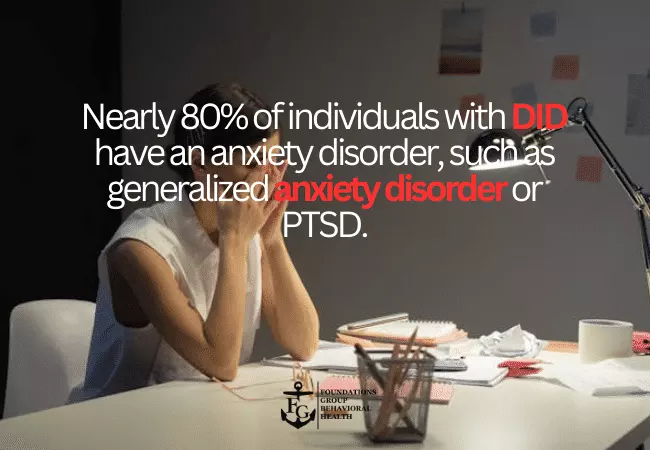Dissociative Identity Disorder (DID), formerly known as multiple personality disorder, is one of the most complex and misunderstood mental health conditions. It is characterized by the presence of two or more distinct identities or personality states within a single person. These identities may have their own names, histories, and characteristics, and they often take control of the individual’s behavior at different times. This condition is also accompanied by significant memory gaps, which go beyond ordinary forgetfulness and typically involve gaps in memory about personal information, daily events, or traumatic experiences.
For those with DID, the challenges of managing multiple identities are often compounded by co-occurring mental health disorders. These co-occurring conditions—such as anxiety, depression, or substance use disorders—can exacerbate symptoms, complicate diagnosis, and make treatment more difficult. However, effective and integrated treatment programs, like those offered at Foundations Group Behavioral Health, can help individuals regain control of their lives. Our programs, including the Psychiatric Day Treatment Program, Half Day Treatment Program, and Outpatient Mental Health Program, are designed to address the unique needs of individuals dealing with DID and co-occurring disorders.
What Are Co-Occurring Disorders?
Co-occurring disorders, also known as comorbidities, refer to the presence of two or more mental health conditions or a mental health condition paired with a substance use disorder in the same individual. For people with DID, co-occurring disorders are particularly common due to the severe trauma—often involving childhood abuse or neglect—that typically underlies the disorder. This trauma not only fragments the identity but also increases susceptibility to other mental health challenges.
Understanding and treating these co-occurring disorders is essential to helping individuals with DID achieve meaningful recovery and improved quality of life. Below are some of the most common co-occurring disorders seen in people with DID.
Understanding Trauma and DID
Dissociative Identity Disorder (DID) is deeply rooted in trauma, often developing as a coping mechanism for individuals who have endured severe and prolonged abuse or neglect during their formative years. Trauma experienced in early childhood, particularly before the age of 8, can have a profound impact on brain development and emotional regulation. For many with DID, this trauma is so overwhelming that the mind creates alternate identities, or “alters,” to compartmentalize the pain and manage the unmanageable.
This defense mechanism allows the individual to distance themselves from the traumatic experiences, but it can also lead to significant challenges in adulthood. Each identity may carry its own memories, emotions, and behaviors, making it difficult for the individual to reconcile their experiences or maintain a cohesive sense of self. The lingering effects of trauma, such as hypervigilance, emotional numbness, or intrusive memories, often contribute to the development of co-occurring conditions like anxiety, depression, or post-traumatic stress disorder (PTSD).
Effective treatment for DID must address the trauma at its core, helping individuals process these painful experiences while learning healthier ways to cope. Trauma-informed care, such as that offered in Psychiatric Day Treatment Programs or Outpatient Mental Health Programs, provides a safe and supportive environment for healing.
Common Co-Occurring Disorders in DID
- Anxiety Disorders
Anxiety disorders, such as generalized anxiety disorder (GAD), panic disorder, or social anxiety disorder, are frequently reported in individuals with DID. These conditions may stem from the overwhelming stress of managing different identities or from trauma-related triggers. Symptoms of anxiety can include excessive worry, restlessness, muscle tension, and difficulty concentrating. At Foundations Group Behavioral Health, our Anxiety Treatment Program helps individuals reduce anxiety and develop coping mechanisms to manage stress. - Depressive Disorders
Depression is another common co-occurring condition. Many individuals with DID struggle with feelings of sadness, hopelessness, and worthlessness, which may arise from the isolation or confusion they experience. Depression can also result from the impact of unresolved trauma. Treating depression through a dedicated Depressive Disorder Treatment Program is critical for improving emotional stability and quality of life. - Post-Traumatic Stress Disorder (PTSD)
Since DID is closely linked to severe trauma, most individuals with DID also meet the criteria for PTSD. PTSD symptoms include flashbacks, nightmares, emotional numbness, and heightened vigilance, which can overlap with or intensify DID symptoms. A trauma-focused approach that addresses both PTSD and DID is essential for lasting recovery. - Bipolar Disorder
Emotional instability is a hallmark of DID, but in some cases, it overlaps with or co-occurs with bipolar disorder. Individuals with bipolar disorder experience extreme mood swings ranging from depressive episodes to manic or hypomanic states. At Foundations Group Behavioral Health, our Bipolar Disorder Treatment Program uses evidence-based therapies and medication management to stabilize moods. - Substance Use Disorders
Substance use disorders are also common among people with DID, as some individuals turn to drugs or alcohol to cope with emotional distress, trauma, or the challenges of managing dissociative symptoms. Integrated care through our Co-Occurring Disorder Treatment Program ensures that substance use and DID are addressed simultaneously for effective recovery. - Eating Disorders
Eating disorders, such as anorexia nervosa or bulimia, are often linked to trauma and are common co-occurring conditions with DID. These disorders may serve as a form of control in an otherwise chaotic life, and addressing them requires a compassionate, holistic approach.
Why Co-Occurring Disorders Are Common with DID
The high prevalence of co-occurring disorders among individuals with DID can be attributed to the condition’s traumatic origins. DID typically develops as a survival mechanism in response to severe and prolonged trauma, particularly during childhood. This trauma leaves deep emotional scars and creates vulnerabilities to other mental health challenges. The interplay between DID and co-occurring disorders can worsen symptoms, making it critical for treatment to address all conditions simultaneously.
For instance, untreated anxiety or depression can exacerbate dissociative episodes, while unresolved PTSD can intensify identity switching and memory gaps. Similarly, substance use can interfere with therapy and worsen dissociative symptoms. Without an integrated approach, individuals may find it difficult to manage these interconnected challenges effectively.
Integrated Treatment for DID and Co-Occurring Disorders
At Foundations Group Behavioral Health, we specialize in providing comprehensive and integrated care for individuals with DID and co-occurring disorders. Our treatment programs are tailored to address the unique needs of each individual, focusing on both the root causes and the symptoms of their conditions. Our offerings include:
- Psychiatric Day Treatment Program
A structured and intensive program designed to provide therapeutic interventions during the day while allowing patients to return home at night. This program is ideal for individuals who require focused care without full-time residential treatment. - Half Day Treatment Program
A flexible treatment option that provides concentrated therapeutic support for individuals with less severe symptoms or those transitioning from more intensive care. - Outpatient Mental Health Program
For individuals who need ongoing support while maintaining their daily responsibilities, this program offers a wide range of therapeutic services in a less intensive setting. - Anxiety Treatment Program
Evidence-based approaches to help individuals manage and reduce anxiety, fostering emotional resilience and improved coping skills. - Depressive Disorder Treatment Program
Tailored therapies to address symptoms of depression and help individuals regain motivation and joy in life. - Bipolar Disorder Treatment Program
Comprehensive care for stabilizing mood swings and managing the challenges of bipolar disorder. - Co-Occurring Disorder Treatment Program
A holistic approach that simultaneously addresses DID and any co-occurring mental health or substance use disorders.
Challenges in Diagnosing DID and Co-Occurring Disorders
Diagnosing Dissociative Identity Disorder is a complex process, often made more difficult by its high comorbidity with other mental health conditions. Symptoms of DID, such as memory gaps, identity shifts, or dissociation, can be mistaken for other disorders like bipolar disorder, borderline personality disorder, or schizophrenia. These overlaps often lead to misdiagnoses, delaying proper treatment and potentially worsening the individual’s condition.
Complicating matters further, co-occurring disorders can mask or mimic DID symptoms. For instance:
- Anxiety disorders may present as heightened arousal or panic, which could be misinterpreted as emotional instability.
- Depressive disorders can overshadow the signs of dissociation, making it harder to identify the presence of multiple identities.
- Substance use disorders might appear to explain erratic behaviors, when in reality, these behaviors stem from untreated DID.
Accurate diagnosis requires a thorough and trauma-informed evaluation by a mental health professional who specializes in dissociative disorders. Integrated treatment programs, like the Half Day Treatment Program and Co-Occurring Disorder Treatment Program, are particularly effective in addressing both DID and its associated conditions by ensuring all symptoms are carefully assessed and treated.

How Co-Occurring Disorders Affect Treatment Outcomes
The presence of co-occurring disorders can significantly impact the treatment outcomes for individuals with DID. Conditions like anxiety, depression, PTSD, or substance use disorders often amplify the challenges associated with managing DID. These disorders may:
- Exacerbate dissociative symptoms: For example, untreated PTSD can increase the frequency and intensity of identity shifts or memory gaps.
- Interfere with therapeutic progress: Anxiety or depressive episodes may hinder an individual’s ability to engage fully in therapy sessions or develop trust with their therapist.
- Prolong instability: Co-occurring conditions like bipolar disorder or substance use can destabilize emotions and behavior, making it harder to create a foundation for recovery.
The Benefits of Integrated Treatment
Integrated treatment offers numerous advantages for individuals with DID and co-occurring disorders, including:
- Holistic Care: Addressing all mental health challenges for a comprehensive recovery.
- Improved Diagnosis: Differentiating overlapping symptoms to create more accurate treatment plans.
- Emotional Stability: Providing tools and strategies to manage mood swings, anxiety, and depression.
- Trauma Processing: Offering trauma-focused therapies to address the root causes of DID and its co-occurring conditions.
- Sustainable Recovery: Equipping individuals with the skills to maintain stability and improve their quality of life.
Get Help Today
If you or a loved one is struggling with Dissociative Identity Disorder or co-occurring conditions, know that help is available. At Foundations Group Behavioral Health, we are committed to helping individuals overcome their challenges through compassionate and evidence-based care.
Contact us today to learn more about our Behavioral Health Treatment Center in Massachusetts and how our specialized programs, including the Psychiatric Day Treatment Program, Half Day Treatment Program, and Outpatient Mental Health Program, can support your journey to recovery. Let us help you build a healthier, more stable future—one step at a time. Call us at 888.685.9730 to start your journey to a mindful future.
FAQ on Co-Occurring Disorders of Dissociative Identity Disorder
What is Dissociative Identity Disorder (DID)?
Dissociative Identity Disorder (DID) is a mental health condition characterized by the presence of two or more distinct identities or personality states, along with memory gaps and dissociation. It is often rooted in severe trauma experienced during early childhood.
What causes Dissociative Identity Disorder?
DID typically develops as a coping mechanism in response to severe and prolonged trauma, such as abuse or neglect during childhood. The condition allows individuals to compartmentalize painful experiences by creating alternate identities.
What are common co-occurring disorders with DID?
Individuals with DID often experience co-occurring disorders, including anxiety disorders, depressive disorders, bipolar disorder, post-traumatic stress disorder (PTSD), substance use disorders, and eating disorders
Why is diagnosing DID challenging?
DID is often misdiagnosed because its symptoms, such as mood swings, memory gaps, and dissociation, overlap with other mental health conditions like bipolar disorder or borderline personality disorder. Co-occurring disorders can further complicate the diagnostic process.
How do co-occurring disorders affect treatment for DID?
Co-occurring disorders can intensify dissociative symptoms, interfere with therapy, and prolong emotional instability. Integrated treatment programs that address DID and associated conditions simultaneously are essential for effective care.








